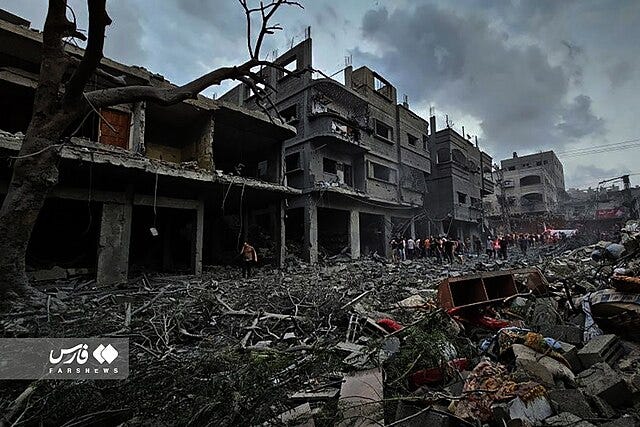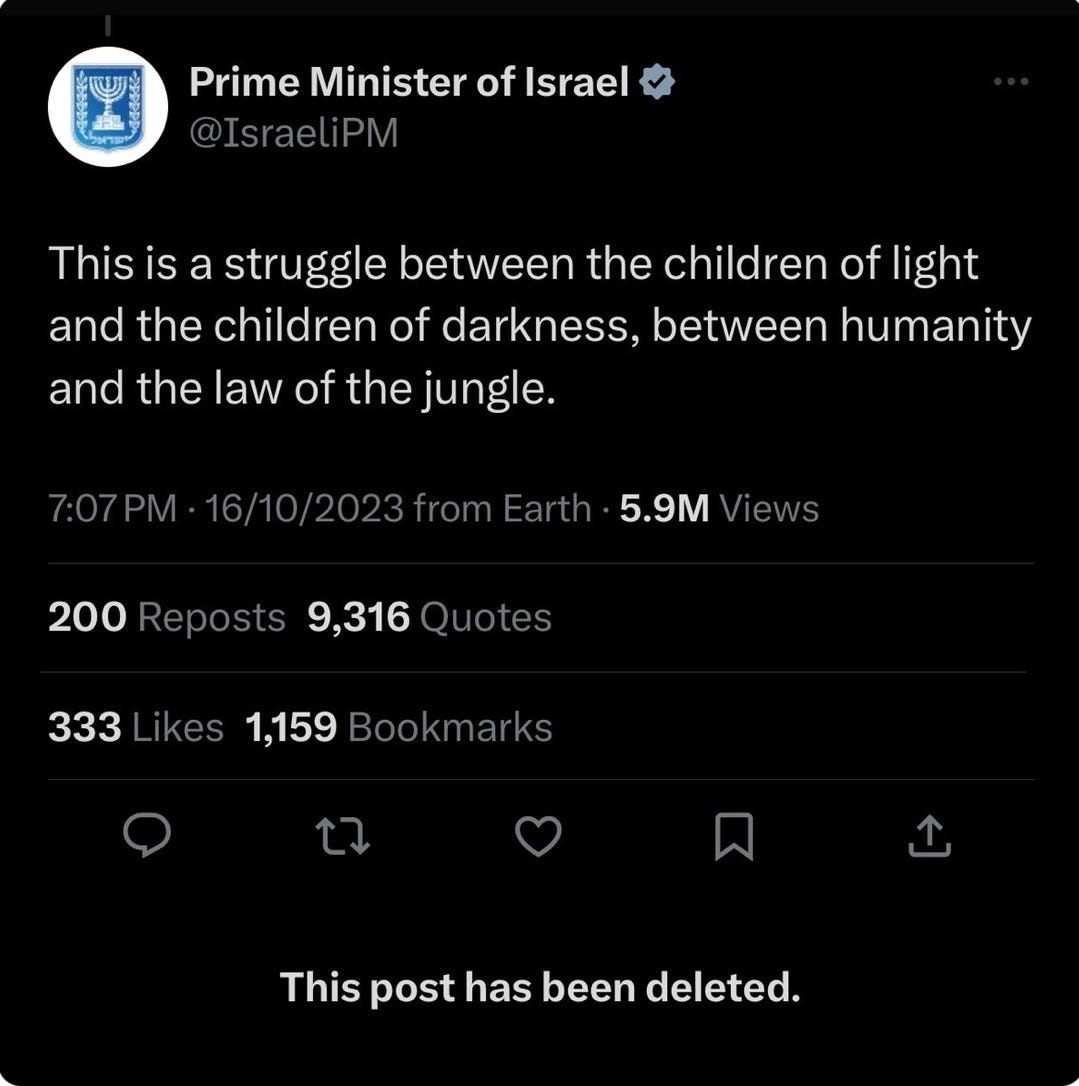If there’s one concept that I’ve learned to be wary of in the 21st century, it’s ‘moral clarity.’ I first became aware of the term in the aftermath of 9/11, through the conservative writer William Bennett’s 2002 book Why We Fight: Moral Clarity and the War on Terrorism.
Moral clarity is almost always invoked in ‘why we fight’ justifications for waging wars on terrorism. Those who use this kind of language tend to imagine such wars - and demand that such wars are seen - as unambiguous conflicts between good and evil, in which the state is entitled and even obliged to use whatever means are necessary to defeat the terrorists.
Once this binary framework is accepted, any attempt to understand the motives, context, tactics, or strategy of the terrorist organization or movement, or even suggest that the state might bear some responsibility for the emergence of such movements, becomes a concession to evil, and evidence of the absence of a moral compass.
Like heresy in the olden days, terrorism is such a fearful and toxic force that it cannot be understood or even thought about, except in quasi-theological terms. To make such an effort, or even to criticize the tactics or the methods of the ‘counter’ terrorist state, is to be guilty of ‘moral equivalence’ - the ugly sister of moral clarity.
It doesn’t matter how many people die as a result of wars on terror - even if they die in far greater numbers than those who die in acts of terror. The evil of terrorism always justifies them, and such wars can never be limited or cut short.
To the moral counterterrorists, this is not about numbers, especially the numbers of people who don’t matter, and there is always a difference - a moral difference - between the terrorist who plants a bomb in a crowded market and the state that drops a bomb in a crowded market or destroys an entire neighbourhood.
The first is always a crime, the second is always a tragedy. And that is why terrorists are so often described as animals, wild beasts or hostis humani generis - the enemy of mankind.
Because you cannot understand or accommodate or reason with a wild beast, and only a fool, a lunatic, or a moral coward would try. Instead the theologians demand that you accept their version of every terrorist emergency. Do terrorists have a legitimate political cause or grievance, even if their methods or not legitimate? No. Why are there terrorists in the world? Because terrorism exists. Why does terrorism exist? Because there are terrorists in the world. What is terrorism? Something that terrorists do. Where do terrorists come from? From terrorism. And what we do about terrorism? Fight it, until it is erased from the earth.
Needless to say, wars fought on these premises rarely end well, either for those on the receiving end of them, or for those who start them. Did William Bennett imagine that US soldiers would end up dressing Arab prisoners in female underwear and setting dogs on them? Did he foresee that the US would lose two wars, in part, because the clarity he demanded rarely clarified anything? Probably not.
The ‘Israeli-Palestinian conflict’ has often been accompanied by rhetoric like this. Long before the horrific events of the last two weeks, Israel explained its long struggle with the Palestinians as a war between democracy and terror, between the villa and the jungle, whether this framework was applied to Fateh, the PFLP, or Abu Nidal.
In recent years, it has often been attached to Hamas and Gaza. In 2009, Alan Dershowitz - no surprises here - wrote a book called The Case for Moral Clarity: Israel, Hamas and Gaza. In 2021 Charles Krauthammer weighed in, with the following observation:
Some geopolitical conflicts are morally complicated. The Israel-Gaza war is not. It possesses a moral clarity not only rare but excruciating. Israel is so scrupulous about civilian life that, risking the element of surprise, it contacts enemy noncombatants in advance to warn them of approaching danger.
Some may regard the concept of ‘enemy noncombatants’ as a contradiction in terms, or conclude that telling a ‘noncombatant’ family that you are about to blow their house to smithereens is not as humanitarian as it looks to Krauthammer.
Others may ask why, in all the Gaza wars and the periods of ‘peace’ in between, Palestinian casualties -both combatants and civilians - have consistently outnumbered Israelis, and why in all these wars, Israel has had a virtual carte blanche to do anything it wanted, as Private Eye suggested this week:
Private Eye and Ian Hislop have received exactly the kind of criticism you might expect, from exactly the kind of people you might expect. Because covers like this are not the stuff of moral clarity, but another demonstration of the moral depravity that Newsweek editor-at-large Josh Hammer, described in a 2021 article on “the Palestinians' century-long civilizational jihad to destroy the world's sole Jewish state.”
There is too much wrong with that characterization to go into here. But if you believe this kind of ahistorical nonsense, then you are not best-placed to make serious observations on the morality of any armed conflict, and you are not so much a journalist as a propagandist.
Nevertheless, if you accept what Hammer is proposing, a lot of things become possible, and some things become impossible. Because what can you do with a people engaged in ‘civilizational jihad’ except occupy their land, or keep them locked up behind walls and cages, and periodically ‘mow the grass’ with bombs, missiles, and white phosphorus as fertiliser?
But now Hamas has broken out of the cage, and containment is no longer enough. Now U.S. Secretary of State Antony Blinken has flown to Tel Aviv to tell Benjamin Netanyahu, ‘Too often in the past, leaders have equivocated in the face of terrorist attacks against Israel and its people. This is — this must be — a moment for moral clarity.’
The Law of the Jungle
As the world has seen many times over, there has rarely been any ‘equivocation’ from Israel, and now there is nothing but the most shocking and relentless devastation. And in case anyone had any doubts as to why it is happening, Netanyahu posted this now-deleted tweet on Monday, using the same words he had used in a speech the day before:
Not everyone describes this struggle in quite these terms, but this is the underlying framework, behind the staggering destruction now unfolding in Gaza. The displacement of nearly 1 million people; the destruction of entire neighbourhoods; cutting off food, water, and electricity to two million people; daily bombings that have already killed more than 4,200 Gazans - all these actions have now become expressions of ‘moral clarity’ from a country that has been the authority to destroy its enemies by all means necessary.
All previous Israeli actions are forgotten. The political context is forgotten. The occupation-from-a-distance is forgotten. The occupier becomes nothing but a victim. Humanity is buried in the rubble in the name of humanity.
Israel likes to suggest that if only Hamas ceased to exist, then everything would become normal again, and ‘peace’ and politics would become possible once again. But there has not been a normal worth keeping in Gaza for many years, and even as Israel and its supporters invoke quasi-theological notions of ‘moral clarity’ and ‘evil’ to justify the wilful destruction of an entire society; at the other end of the political spectrum, there are those who find their own justifications for the unjustifiable:
Or Norman Finkelstein:
If we honor the Jews who revolted in the Warsaw Ghetto - then moral consistency commands that we honor the heroic resistance in Gaza. I, for one, will never begrudge - on the contrary, it warms every fibre of my sould - the scenes of Gaza’s smiling children as their arrogant Jewish supremacist oppressors have, finally, been humbled.
Or the Harvard Undergraduate Palestine Society Committee, which declared, ‘We…hold the Israeli regime entirely responsible’ for Hamas’s attacks.
Did Israel force Hamas operatives to murder women, children, and the elderly, and violate all the codes, customs, and laws that have been drawn up to limit the scope and the severity of war? Should we ‘rejoice’ in these attacks? Is that what ‘resistance’ is? Is Finkelstein’s ‘moral consistency’ a kind of moral-clarity-in-reverse? Such questions are likely, in some sections of the left, to receive comments like this X/Twitter post:
This concept of ‘resistance’ is as vapid in its own way as the notion of ‘moral clarity.’ Where the former uses the occupation to justify or even celebrate any act of violence, either explicitly, or implicitly, by ignoring whatever doesn’t fit within its Warsaw/Tet analogies; the latter invokes the ‘terrorism’ of the terrorist as a justification for its own violations of basic human norms and aspirations.
Both end up in the same place: in a war of vengeance to be fought by any means necessary, that neither side can win.
Hamas has also described its ‘Al Aqsa flood’ operations as ‘resistance’. Its leadership insisted that its targets were military. This is partly true: Hamas operatives did attack military targets - they captured soldiers and a general, after all. But they also shot old people in bus stops, tied up children and burned them to death, and slaughtered hundreds of defenceless partygoers without a weapon between them.
According to the IDF, some Hamas fighters carried orders instructing them to ‘kill as many people as possible.’ Personally, I find the idea that fighters would carry orders like this into combat to be not entirely credible, but nor can it be entirely dismissed. In any case, many people died, who were not-military targets by any stretch of the anti-colonial imagination.
Hamas has denied this, of course. In an interview with the Economist, (paywalled) Moussa Abu Marzouk, a senior member of the Hamas politburo, insisted that his organization ‘obeys all international and moral laws.’
Hamas has also issued a statement insisting that reports of atrocities were ‘fabricated and disseminated by certain Western media outlets that uphold the Zionist narrative.’ On its website, Hamas spokesperson Izzat al-Risheq said ‘We categorically affirm the falsehood of the fabricated allegations promoted by some Western media outlets... the latest of which was the claim of killing children, beheading them, and targeting civilians.’
In an interview on Sky News, Basem Naim, director of Hamas’s international relations also dismissed allegations of atrocities. Although Naim claimed that ‘we didn’t kill any civilians’, he also insisted on the need to
redefine what you mean by civilian. I cannot consider a settler on the West Bank carrying a gun who has stolen my land, burning the city of Harawa a civilian.' We cannot consider anyone sitting around the border working on cyber and artificial intelligence to control and besiege 2.3 million people in an open prison as a civilian.
Redefining civilians, and blurring the distinctions between civilians and combatants into ‘terrorist nests’ and ‘hubs’ is exactly what Israel does, and Naim’s ‘redefinition’ may or may not explain the pogrom-cum-assault which Hamas carried out on 6 October.
That Hamas has the right to resist occupation is indisputable - though Israel and its supporters do dispute it. It’s a right enshrined in various UN resolutions and international conventions relating to military occupations. Israel may not occupy Gaza directly, but as its current restrictions demonstrate, it exercises complete control over its land and maritime borders, its electricity and water, in ways that contradict any notion of territorial sovereignty. Using Hamas as the pretext, it has sealed Gaza off from the West Bank, thereby making a viable Palestinian state impossible to achieve.
Hamas has the moral and legal right to resist this, in accordance with UN General Assembly resolution 37/43 on Dec 3, 1982, which confirmed ‘the legitimacy of the struggle of peoples for independence, territorial integrity, national unity and liberation from colonial and foreign domination and foreign occupation by all available means, including armed struggle”
But that right does not - or should not - entail what took place on 7 October. Article 75 of the Geneva Convention Additional Protocol 1 in 1977, prohibits occupying powers from murder, torture, mutilation, the taking of hostages, and humiliating and degrading treatment.
There is no law anywhere that says an occupied people are entitled to do the same things, yet that is what happened on 7 October. Whether this was done on direct orders from the leadership in Qatar or from the military leadership n Gaza itself, is not known. Nor is it clear what these atrocities were intended to achieve. Was it an all-or-nothing gamble, intended to wreck the Israel-Saudi rapprochement? Did Hamas factor into its calculations that Israel would obliterate the Gaza Strip, but hoped that it could generate enough ‘horizontal’ political support to limit the damage and force Israel to the negotiating table?
We don’t know, but the costs for the people of Gaza has been awful beyond belief, and Hamas bears responsibility for this - which is not the same thing as saying that Hamas is responsible for everything Israel does. Military occupations and episodes of ethnic cleansing are not going to produce saints, but nor should the crimes of the powerful become a justification for the violation of basic human norms by the powerless.
Nor is it the responsibility of those who want to show solidarity with the Palestinians, to applaud or ignore actions that are brazenly immoral and illegal, and also tactically and strategically obtuse. The only time in my life time that the Palestinians have ever held Israel in check, was during the first Intifada, when the entire community, from the old people to young children took part in a range of mostly non-violent actions that Israeli military power could not cope with.
It is not for outsiders to dictate how the Palestinians resist, but not should the ritualistic invocation of the slogan ‘by any means necessary’ obscure or legitimise acts of violence that are cruel, immoral, and often horrifyingly counter-productive.
The result, is the situation we have now, where a savage act of militarism - however audacious - has turned the entire population of Gaza into a military target, and threatens to set the world on fire. And where the principle of ‘any means necessary’ - whether invoked by the occupier and the occupied, has paved the way for a generalised descent into barbarism, and a nightmarish humanitarian catastrophe that can only be prevented by releasing the hostages and an immediate ceasefire.









Thank you Matt - an in depth and clear-headed overview.
The look on Sunak’s phiz as Netanyahu’s rhetoric bound him to what has just been done and more so, what is yet to come, made me think that there’ll be some tiptoeing back from an “unequivocal” stance of support over the next few days, weeks, maybe months.
The issue with the slippery slope of redefining morality anew on your terms is that the only thing at the bottom is an abyss into which you never thought you could go.
The comparisons to Northern Ireland/North of Ireland/Ulster aren’t without merit. What you need to give people who have very little to lose is a lot more to lose. They require hope, prospects for prosperity and the respect that comes with this
Immediately they require aid, intensive and meaningful aid. The paucity of commitment in this regards augurs very badly, as does tonight’s news that a ground attack is imminent.
I’m not sure Netanyahu wouldn’t just kick away any ladders thrown his way for climbing down. It seems very likely that the only way out of this will have to emerge from the Israeli people who won’t have ceaseless barbarism, however one justifies it, carried out in their name.
What Hamas did was hideous. They knew they’d get a reaction and they will receive one I suspect their fevered nightmares didn’t dare expect. But who wins? Who loses less badly?
I can only agree with Robin M's comments on your article Matt. As you say barbarism comes in different forms and right now both sides seem set on continuing the downward spiral. Biden's comments suggesting Israeli restraint offer only the faintest hope. Unlikely to be fulfilled as long as Hamas continue to hold hostages. Neither side (Hamas and the Israeli government) seems to have anything constructive to offer in terms of a way forward. Just pouring more petrol on the flames, in which the Palestinian population are destined to suffer the most.
And I have just stumbled on your book on terrorism - and ordered it. I studied conflict as part of a post grad course some years ago and it reinforced the underlying complexity of all such situations. They are rarely simple good vs bad as portrayed by politicians and the media, and their supporters on both sides.